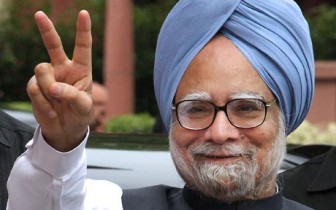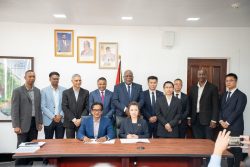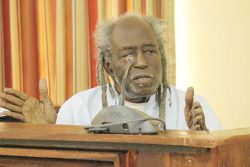MOHALI, India, (Reuters) – The prime ministers of India and Pakistan will mix with Bollywood stars and thousands of fans as the two rivals square off in a World Cup cricket semi-final on Wednesday in the wake of high profile peace talks between the two nations.
The two teams will meet in the northern Indian town of Mohali with army helicopters and anti-aircraft guns imposing a no-fly zone over the stadium a few hours’ drive east of the Pakistan border.
Prime Minister Manmohan Singh will host his Pakistani counterpart, Yusuf Raza Gilani, at the match in an effort at “cricket diplomacy” to rebuild relations shattered by the 2008 Mumbai attacks, in which 166 people were slaughtered.

The two cricket-crazy South Asian nations have talked of little else for the past week in a buildup that has put the spotlight on anything from players’ preparedness to a row over match-fixing to public prayers for victory.
The winner of what has been dubbed the “mother of all matches” will play Sri Lanka in the final in Mumbai, the home of Bollywood, on Saturday.
Many companies in both countries have declared half days on Wednesday. The Karachi stock exchange plans to put a big screen up for traders to watch. Lawmakers in the eastern Indian state of Bihar have petitioned their government to suspend legislative business during match time.
“This is a more important event than any other event for Pakistan this year,” said Omar Ehtisham Anwar, a fund manager at Faysal Asset Management in Karachi who has taken the day off to watch the match.
“There is no way I would miss even a second of this match — I will try to not even blink during the game.”
CRICKET DIPLOMACY
The game pits India’s world-class players, including Sachin Tendulkar, against a Pakistani side that has looked in devastating form and ended Australia’s 12-year winning streak in the competition.
Cricket is just one of the many cultural, religious and ethnic ties the two countries share dating back thousands of years. But the nuclear-armed rivals fought three wars and countless border skirmishes since their 1947 independence from Britain, feeding an obsessive mistrust.
Singh has pushed reconciliation with Pakistan despite misgivings within his own government. New Delhi blames Pakistani militants for the Mumbai assault in collusion with elements of the government, including Pakistan’s spy agency.
In a major confidence-building measure ahead of the match, Islamabad agreed on Tuesday to let Indian investigators travel to Pakistan to probe the Mumbai assault.
Scores of Pakistani fans poured across the border post in India’s northern Punjab state on Tuesday amid tight security.
“Obviously, love grows when two countries play together,” said Syed Akbar Masood Nizami, a Pakistani cricket fan. “The people from both countries get together, sit together to cheer their teams and it helps develop feelings for each other.”
There was a sea of blue-and-red turbans in Mohali and the neighbouring city of Chandigarh which were patrolled by the local Punjab police, with some 1,500 policemen being deployed around the team hotel alone.
Police conducted surprise midnight checks on hotels near the stadium to verify the identity of guests.
Thousands who had travelled to Mohali to queue for tickets were left disappointed but at dusk on Tuesday some die-hards decided to wait in line even after organisers had hung up the “sold out” sign. Some Indians reportedly decided to give up their tickets in a goodwill gesture to Pakistani fans.
For Prime Minister Singh, the match may be a way of regaining the policy initiative after his government was battered by months of corruption scandals that could dent the ruling Congress party’s chances in upcoming state elections.
Both sides will hope to ride a wave of goodwill ahead of ministerial talks in July. But there has been some scepticism about the push for Singh’s “cricket diplomacy”, which has been tried as far back as 1987, without bringing lasting peace.
“It facilitates resolution, it doesn’t lead to resolution,” former Pakistan President Pervez Musharraf told the Indian news channel Times Now. “Cricket diplomacy doesn’t meant that you can resolve disputes just because you attended a match together.”
On Wednesday however, all eyes will be on the game.
“I will be watching the match because there will be hardly any customer out there, so it is better to watch it instead of wasting fuel,” said Idees Ahmed, a taxi driver in Islamabad.









